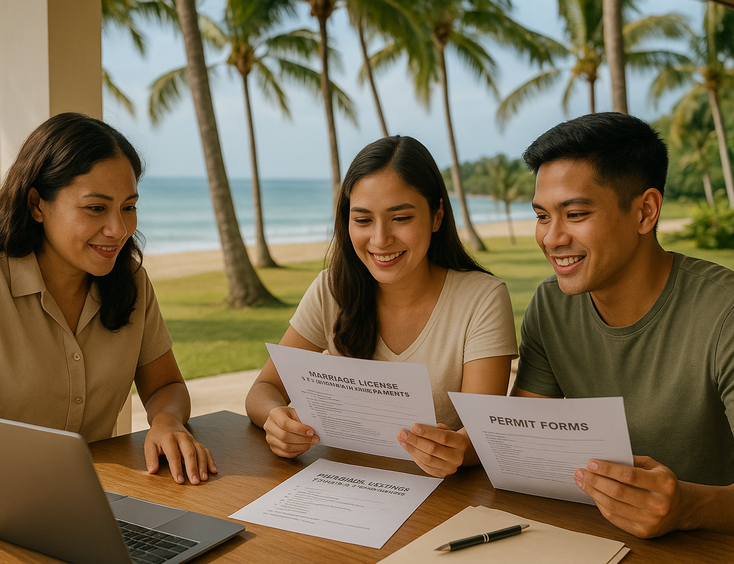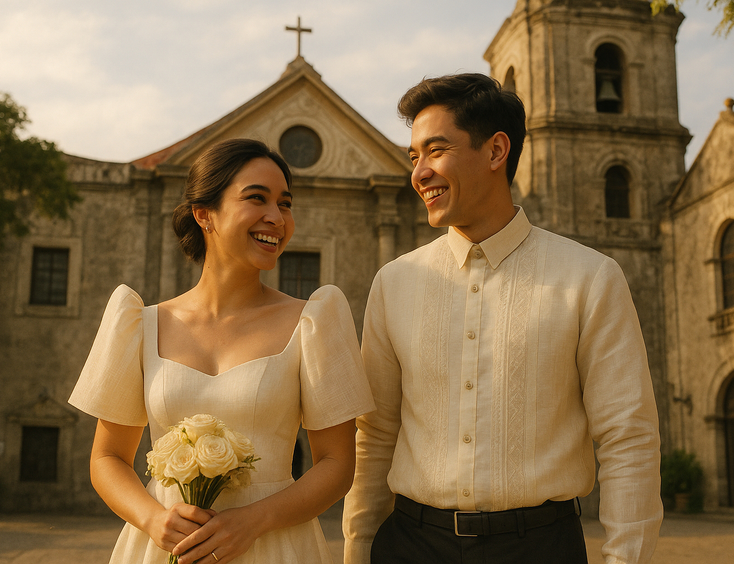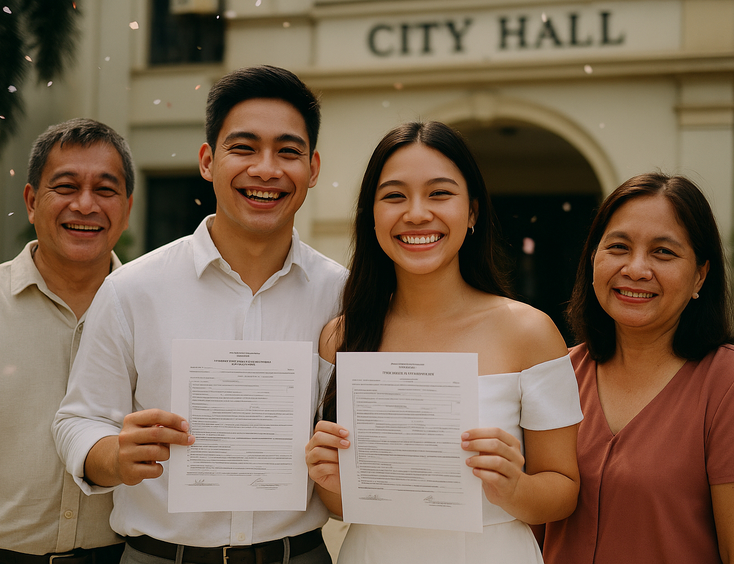
Destination Permits & Marriage License FAQs

Destination weddings in the Philippines are a two-layer puzzle—national civil documents plus local permits. The good news is that with a clear timeline, you can lock dates, secure approvals, and keep surprise fees off your budget. This FAQ-style guide maps the steps that change by location and who is officiating.
What you always need vs what varies
Always: valid IDs, PSA documents as required by your LGU, and a marriage license within its validity window.
Varies: officiant authority, venue permits, environmental or tourism fees, curfews, drone and pyro rules, and barangay or security marshals depending on the site.
If you want someone authorized to solemnize outside government premises, start shortlisting licensed celebrants who regularly coordinate with city halls and courts: browse experienced civil officiants.
Marriage license FAQs
Where do we apply
At the Local Civil Registrar where either party resides. Some LGUs accept non-residents with additional affidavits.
How long is it valid
Typically 120 days from issuance. Plan your destination schedule within that window and avoid applying too early.
Do we need seminars
Many LGUs require a family planning or pre-marriage counseling seminar. Slots can fill quickly—book early.
What about foreign nationals
Expect extra documents such as a certificate of legal capacity to marry and passport copies. Build in lead time for authentication.
If the ceremony is outside our city
Ask the LCR about forwarding or acceptance notes to the destination LGU and confirm any local fees upon registration after the rite.
For a side-by-side of civil pathways and typical costs when choosing a judge, mayor, or court calendar, this explainer helps you plan the leanest route: compare civil ceremony options with real timelines.

Venue permits by setting
Private resort or hotel
The property often handles internal approvals but may still require you to shoulder municipal tourism fees, security marshals for beach access, and fire safety coordination for open flames.
Public beach or park
Expect a location permit, environmental fee, and crowd-control plan. Noise and curfew rules apply, especially near residential zones.
Heritage or protected areas
Permit windows can be longer and may restrict décor, generators, or vehicle access. Ask about shuttle staging and staff passes.
If your heart is set on a shoreline or island chapel, shortlist spaces already familiar with LGU coordination and ingress rules: compare destination-ready ceremony spots.
Special approvals couples forget
- Drone flights: property rules plus local authorization; some venues require a licensed operator and insurance.
- Fireworks and cold sparks: marshal presence and fire bureau clearance; beach winds may trigger stricter limits.
- Open flame décor: covered candles or LED substitutes; written approval from property management.
- Road closures and parking: barangay permits for shuttles and load-in zones.
- Amplified sound: decibel caps and cutoff times enforced by security.

Timelines that actually work
4–5 months out
Confirm ceremony date window with your chosen location. Ask for the current permit checklist and processing times. Pencil in seminar dates and officiant availability.
2–3 months out
Gather PSA documents and affidavits as needed. Reserve the venue and apply for permits that require council or bureau sign-off.
30–45 days out
Apply for the marriage license timed to your destination date. Finalize your program, power plan, and shuttle loops so permits reflect accurate headcounts and hours.
10–14 days out
Pick up permits, confirm marshal schedules, and print copies of all approvals for the coordinator kit.
Registration after the ceremony
For civil rites, ensure the solemnizing officer files the marriage certificate with the destination LCR within the required period. For religious rites, the parish submits to the civil registrar—track the release timetable if you need certified copies for travel or name-change steps.
If your island choice is Boracay or Palawan, expect environmental and resort coordination layers that reward early filing; this field guide outlines the moving parts so you can budget realistically: navigate island-specific logistics and paperwork without stress.

Budget watch-outs
- Courier and rush processing fees near peak dates
- Security marshals and overtime tied to late program changes
- Generator fuel and backup units for beachfront power
- Shuttle and boat transfers for crew and guests
- Permit reissuance if dates shift outside the license window
When the admin pile grows, a logistics-first partner keeps forms, cutoffs, and site rules on track so your day doesn’t slip into overtime: partner with planners who thrive on destination timelines.
Quick checklist
- License application timed to your ceremony week
- Officiant authority verified for the destination LGU
- Venue permit with schedule, headcount, and power noted
- Drone, fireworks, and open-flame approvals if applicable
- Shuttle plan, parking, and security headcounts documented
- Copies of IDs, permits, and a contact tree for day-of
For the numbers side—how permits, travel, and venue choices fit into a full wedding budget—use a national framework to set category percentages and regional ranges: align your destination plan with a countrywide cost guide.
To wrap the details in a ceremony that feels personal yet compliant, match your paperwork timing with a celebrant who communicates clearly and shows up prepared: find civil officiators known for smooth coordination. Then lock a space that photographs well and welcomes your headcount without red tape: shortlist chapels and beachfront lawns with established wedding policies.
Find Your Perfect Wedding Supplier Today!
Discover trusted wedding suppliers across the Philippines in our complete directory. Compare services and connect with the ones that fit your dream celebration.
Browse Wedding Suppliers



